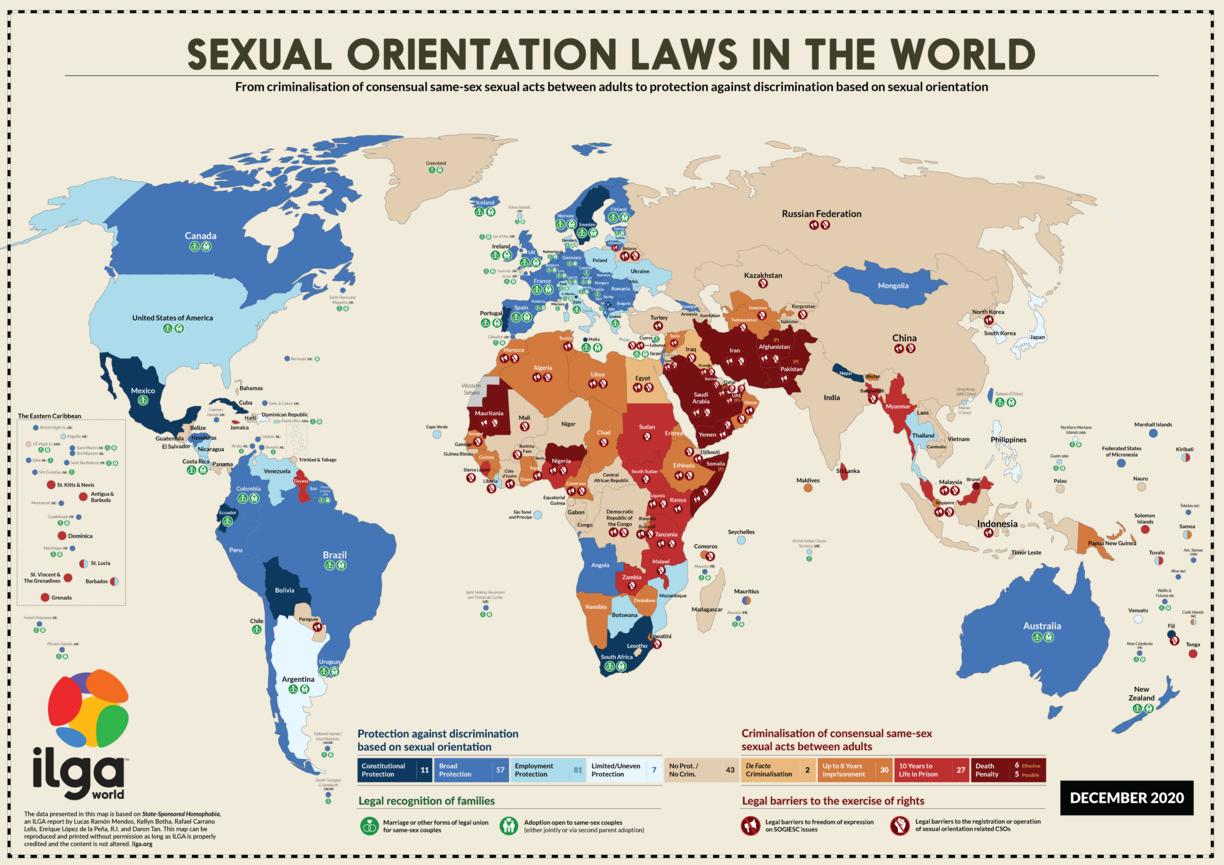You may already identify as lesbian, gay, bisexual, transgender, or queer, or you may still be exploring your identity. In either case, you will find that the social climate, laws, and personal interactions of other cultures will often differ. While researching study abroad programs and preparing for departure, it is important to reflect on the culturally based ideas and definitions of gender and sexual identity. Consider carefully how your identity as a member, questioning member, or ally of the 2SLGBTQ+ community may influence your relationships within your study abroad program, your cultural adjustment in the host country, and your overall International Mobility experience.
It is also important to be aware of the laws on gender and/or sexual identity in your study abroad destination as well as the popular attitudes toward lesbian, gay, bisexual, transgender, or queer individuals. Some students feel more accepted abroad than they do in Canada, while others feel discrimination or harassment. Whatever the general attitude is toward gender and/or sexual identity in your study abroad destination, there will be those who dissent from the general attitude one way or the other. Try to talk with other 2SLGBTQ+ students who have studied abroad in your destination country and refer to the resources below for more support.
Information was resourced and adapted from: NYTimes: How to Plan a Safe Trip for Gay and Transgender Travelers, LGBTI Travel Information, and the Gay Travel Index.
- How open am I now about my sexual orientation and gender identity? How open am I willing/hoping to be when I am studying abroad?
- Do I only want to go somewhere that is very tolerant and affirming of my identity? Am I open to going to a country that may discriminate against 2SLGBTQ+ individuals?
- How important is it to me to find other 2SLGBTQ+ students during my study abroad program?
- Does the country or host institution I’m interested in have resources and supports available for 2SLGBTQ+ individuals?
- What are the cultural attitudes toward sexual orientation and gender identity in my host country? What are the local attitudes and customs in the region of the country where I will be studying?
- Are there any laws restricting same-sex relationships?
- What are the laws regarding identity and travel documentation?
- What types of relationship behaviour are acceptable in my study abroad destination? This can even include hand-holding or association with 2SLGBTQ+ folk.
- Are there resources available for people of alternative sexual and gender identities in my study abroad destination and institution?
- Does my host university have organizations and/or student groups for 2SLGBTQ+ students? Are there 2SLGBTQ+ friendly establishments nearby?
- If I need access to medication, supplies, or medical services, will I have access in my host country? Will I need documentation to travel with medication (i.e. hormones)?
- How open am I now about my sexual orientation and gender identity? How open am I willing/hoping to be when I am studying abroad?
- Do I only want to go somewhere that is very tolerant and affirming of my identity? Am I open to going to a country that may discriminate against 2SLGBTQ+ individuals?
- How important is it to me to find other 2SLGBTQ+ students during my study abroad program?
- Does the country or host institution I’m interested in have resources and supports available for 2SLGBTQ+ individuals?
- What are the cultural attitudes toward sexual orientation and gender identity in my host country? What are the local attitudes and customs in the region of the country where I will be studying?
- Are there any laws restricting same-sex relationships?
- What are the laws regarding identity and travel documentation?
- What types of relationship behaviour are acceptable in my study abroad destination? This can even include hand-holding or association with 2SLGBTQ+ folk.
- Are there resources available for people of alternative sexual and gender identities in my study abroad destination and institution?
- Does my host university have organizations and/or student groups for 2SLGBTQ+ students? Are there 2SLGBTQ+ friendly establishments nearby?
- If I need access to medication, supplies, or medical services, will I have access in my host country? Will I need documentation to travel with medication (i.e. hormones)?
The Government of Canada’s Travel and Safety Guide outlines the following indicators for 2SLGBTQ+ travel
Visit the Travel Advice and Advisories pages for your destination countries. The “Laws and culture” tab may contain information on the laws and social customs that could affect 2SLGBTQ+ Canadians there. Watch for laws that:
- criminalize same-sex activities and relationships
- criminalize people based on their sexual orientation, gender identity, gender expression, and sex characteristics
- Some countries may use laws related to “vagrancy”, “public nuisance” or “public morals” to criminalize 2SLGBTQ+ folk.
- Research the laws, safety recommendations and social customs related to sexual orientation, gender identity, gender expression and sex characteristics in your destination country.
- The Government of Canada also provides information about your passport:
- If your passport indicates “X” as a gender marker or if it indicates, "the sex of the bearer should read as X, indicating that it is unspecified," you might face entry restrictions into some countries that do not recognize your gender.
- Check the Travel Advice and Advisory for each destination and transit country to find out if you could face entry restrictions.
- In some cases, even if your Canadian passport indicates an “X” gender marker, you may still be asked to provide binary sex information (either Male or Female) when travelling.
- If you have changed your name legally, you have to apply for a new passport. For more information on updating your passport, including updating your gender identifier, see Canadian passports.
- While the Government of Canada recognizes the “X” gender identifier, it cannot guarantee your entry or transit through other countries.
If you need help while abroad about 2SLGBTQ+ safety issues
- Contact the nearest Canadian government office abroad or the Emergency Watch and Response Centre for consular help while you are outside Canada.
- Inform consular officials of any harassment or inappropriate treatment you may have faced. They may be able to help you.
- Consular officials can also help if you are arrested and detained, are ill or injured, or are facing an international custody problem. For more information on consular services see the Canadian Consular Services Charter.
- Any information you provide will remain confidential, subject to the provisions of the Privacy Act. For more information see Consular Policy Regarding the Use and Disclosure of Personal Information.
Positive indicators to look for when choosing your destination include
- Legalized same-sex marriage
- 2SLGBTQ+ worker protections
- Legal protection against anti-discrimination
- Hate crime penalties
- Transgender legal identity laws
- Does the host school have any listed supports such as inclusive washrooms?

- You can also refer to the Gay Travel Index (2018) when assessing a country's level of tolerance.
- Consider the impact of potential freedoms that individuals can experience entering a new environment – with the anonymity/freedom gained, some people might put themselves into risky situations while exploring that freedom, and should be mindful of how best to mitigate any dangers.
The most important step that 2SLGBTQ+ travellers can take during the planning stages to enhance their safety and comfort on a trip is conducting thorough research on their destination. It is important to understand the cultural, legal and security issues that affect the 2SLGBTQ+ community in the locations you are visiting. You should also consider your own profile and if that destination is right for you, as well as the sort of experience you want to have in your travels. You do not necessarily have to avoid a location, but you will have to be aware of how you conduct yourself based on the laws and cultural climate of the place you plan to visit.
In some countries, identifying as 2SLGBTQ+ may simply be culturally frowned upon. In more conservative societies, shows of affection considered innocent by Western standards, like touching or holding hands, even between heterosexual couples, may be against cultural and religious practices.
You should not only research the social norms of the place you are visiting, but also the local laws. In some countries, identifying as 2SLGBTQ+ is illegal. In these locations, 2SLGBTQ+ individuals can be barred from entering the country entirely or can be subject to detention or legal action if suspected of engaging in or promoting homosexual activity.
During your study abroad experience, let a trusted contact back home know your general itinerary, including anyone you have planned to meet while on your trip.
Transgender travelers may face additional scrutiny when departing from and arriving at airports and when navigating the cultural and legal landscape of a different country. When considering a destination, know that some countries may refuse entry to individuals whose documented gender does not reflect their presentation. Understand that cultural attitudes toward and laws regarding transgender people in conservative societies may present an unwelcoming and unsafe environment.
Transgender folk must make additional considerations when conducting air travel. Security procedures at airports, such as pat-downs, increased scrutiny from security personnel and body scanners, can be distressing to transgender folk, and there are steps that can be taken to be prepared for airport security protocols. Researching the procedures and necessary documentation for airport security in your home country and in your intended destination is important.
In addition, you may wish to consider how your accommodation choice might be impacted by your comfort with being ‘out’ regardless of your sexual or gender identity. Aim to predict and mitigate any issues presented by navigating multi-cultural spaces at your host university where you may be interacting with other international students from more conservative backgrounds.
- LGBTQ Guide to Travel Safety (Man About World)
- ILGA Sexual Orientation Laws in the World - Map
- NYTimes: How to Plan a Safe Trip for Gay and Transgender Travelers
- LGBTI Travel Information (US Department of State)
- Sexual Orientation Abroad (Diversity Abroad)
- International Lesbian Gay, Bisexual, Trans, and Intersex Association
- Gay Travel Index – Countries ranked bylaws & cultural considerations
- Rainbow Special Interest Group (NAFSA)
- GlobalGayz
- Know An LGBTQ Student Itching To Study Abroad? Here Are Some Things To Think About - NPR
- USF: GBT Student Guide for Education Abroad
- The 519
- Case Western Reserve: LGBT Study Abroad Guide (pg.30)
- LOUD Foundation: Scholarships are awarded to Canadian LGBTQ+ students who possess the qualities to raise awareness and make a real difference in the community
- The Bill 7 Award: Financial support is given to LGBTQ+ students who are pursuing their first degree or diploma at any higher-education institute in Ontario
